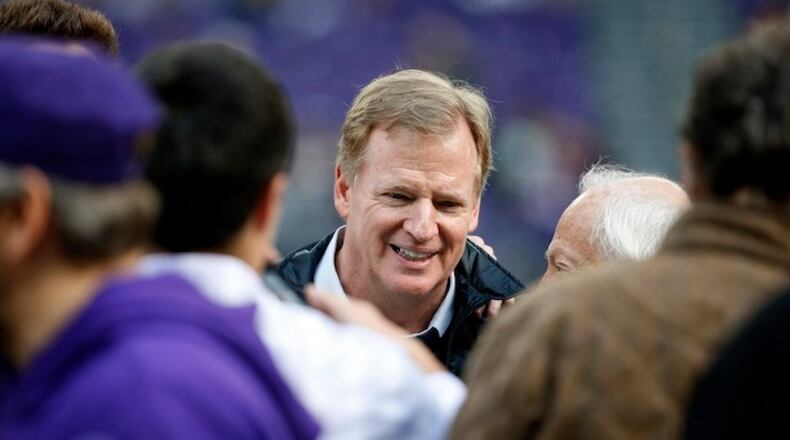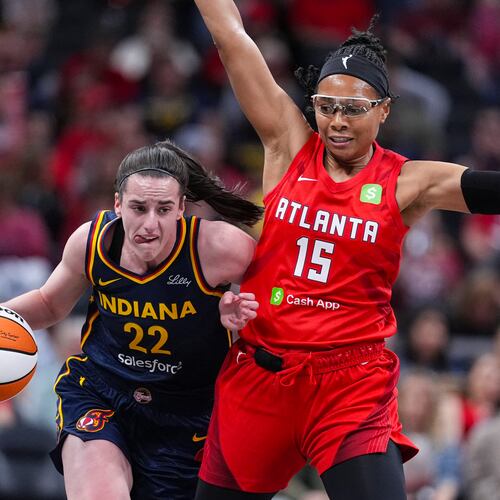If you're going to sign your outfit's top executive to a long-term compensation deal worth tens of millions of dollars, you want to be absolutely confident he can handle any crisis, shut down the pitchforks, snuff out the torches and restore order.
Roger Goodell, the National Football League commissioner, will probably be just fine anyway.
The ruckus over whether players should — or should be allowed to — protest racial injustice during the national anthem is, without question, dragging on at an awkward time for Goodell. His contract with the NFL, which paid him more than $205 million between 2008 and 2015 (the last year that was made public), expires in 2019. A proposed five-year extension is before league officials. They're discussing it against furious background noise and a lot of people calling for the commissioner's head. He hasn't managed to tamp it down.
Fans have burned jerseys and boycotted games. The media have been relentless, with Townhall.com Editor Katie Pavlich blasting Goodell as a "coward," Breitbart News labeling him a "protester PR hack" and Fox Business anchor Lou Dobbs referring to him as "gutless Goodell." League officials and Goodell didn't respond to requests for comment.
The commissioner, though, isn't beholden to pundits or the droves of angry people on Twitter, even the one who lives in the White House. The faith of team owners is all that really matters. This has long been a fact of widespread misunderstanding. As Fay Vincent, the former head of Major League Baseball, once explained to Bloomberg News, "The great myth that you have to deal with is that the commissioner is a public servant."
With the exception of the Green Bay Packers, the NFL is a collection of private businesses, run by a small pack of billionaires. And since becoming commissioner in 2006, Goodell had made them gobs of money.
"Even people who may disagree with how some social issues are being handled, he is still their guy," said Marc Ganis, president of the influential consulting firm Sportscorp Ltd., after members of the NFL's compensation committee met in New York last week. Based on his conversations with them, Ganis said, Goodell's contract extension is "pretty much done — there was no expression of wanting to go in a different direction."
This season, the NFL will bring in some $14 billion in revenue, according to SportsBusiness Journal, an increase of more than $900 million over last season and a huge jump from the roughly $6.6 billion it made in 2006. The lavish growth has hardly sated Goodell's ambitions to make his bosses even richer. He has said that by 2027, he'd like to see the NFL pull in $25 billion.
The commissioner has also helped the league slalom through a minefield of potentially ruinous hazards. For years, no matter what horror has arrived on the doorstep — injured brains, battered spouses, deflated footballs, softening ratings, scab referees, — Goodell has always dutifully answered the doorbell, draped in his boxy, pin-striped suit of armor, flashing his tight-lipped smile and calmly repeating a rote paean to the unwavering, greatness of the game.
Along the way, he has emerged as a favorite target for bloodthirsty fans. In that, too, he performs a valuable service, effectively drawing anger away from press-averse owners.
His skills were on display at a news conference last week where he expressed his hope that all players would stand for the anthem but reiterated the NFL wouldn't force anybody to do so. Moving forward, he said, the league would work with players to support their social-justice goals off the field. "We're not looking to get into politics," Goodell said. "What we're looking to do is to continue to get people focused on football."
The performance did nothing to placate President Donald Trump, and left plenty of others fuming. But with the audience that matters most, it went over well. "Nobody wants the protests to continue because it has had an effect on business and it has provoked a huge emotional response from our fans," New York Giants co-owner John Mara told reporters. "But I think all of us, or just about all of us, are in agreement that we need to continue to have this dialogue with the players."
There's no doubt Goodell will continue to face harsh scrutiny, along with the NFL, as long as the anthem issue grabs headlines. Protests continued during week seven of the season, including before the game Sunday between the Dallas Cowboys and San Francisco 49ers. All the Cowboys remained upright, though defensive end David Irving briefly raised his fist at the end of the song, while several 49ers kneeled. Dallas Cowboys owner Jerry Jones, who recently vowed to bench any team member who didn't stand for "The Star-Spangled Banner," told reporters the league was being hurt by players taking the knee, as it's called.
The matter "has been allowed to fester," said Bob Zito, founder of Zito Partners, a crisis management firm. "Goodell has to be able to find the best solution to get this off the front page, as soon as possible." That's important for the league, not necessarily his contract negotiations.
About the Author
Keep Reading
The Latest
Featured


